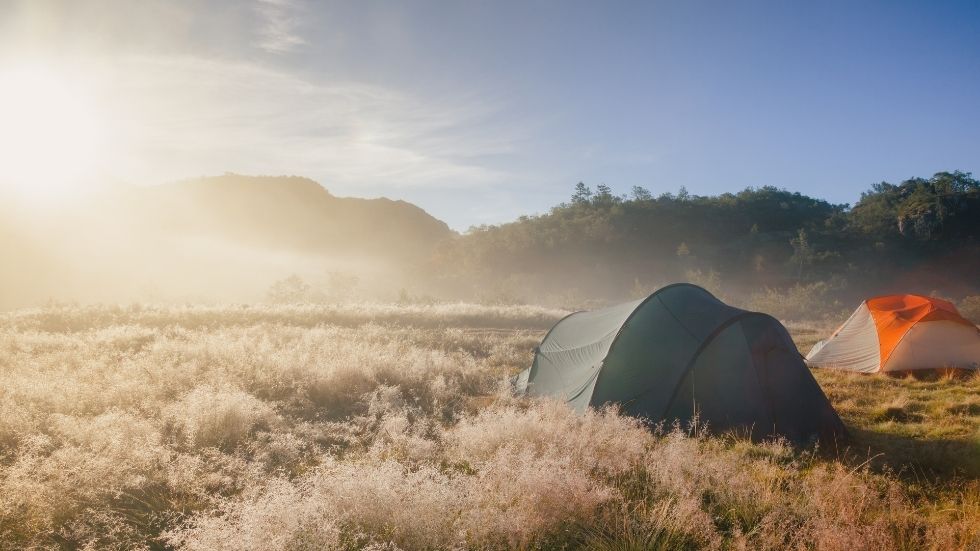Is it legal to camp anywhere in the UK?

Amid a global pandemic and with travel restrictions looming large in the UK, travelling to a holiday destination abroad may seem a far stretch. However, not to fall into a pit of despair, the weather seems to be on the up. With warmer weather and the glorious countryside, camping is a great alternative. Whilst camping is an attractive option, it is important to be mindful of the laws concerning camping and wild camping in the UK. Equipped with the knowledge of the law, you can set out and enjoy your camping adventure with confidence!
Camping anywhere in England and Wales
Generally, it is illegal to wild camp in England and Wales without the express permission of the landowner. Many landowners are happy to host wild campers, but only if they are respectful of the area they are camping.
You may wish to venture out to the various national English parks. Whilst no express rules allow wild camping, you may be pleased to know that some English parks permit wild camping in selected areas. This includes Dartmoor National Park which permits certain forms of wild camping. It does not mean that you simply drive up to the national park and pitch up. However, it allows you to set up your tent for a break if you are on a multi-day walking trip. Should you wish to set up wild camp in other National Parks including the Peak District, all you require is the landowner’s permission, and be sure to leave no trace when you set off again on your travels.
The situation differs in Wales which permits wild camping for a set list of local farms. The Brecon Beacons National Park Authority provides a list of local farms. Some of the farms included on the list include the Argoed Barns which offers spectacular panoramic views from Hay Bluff to round to the Brecon Beacons via the Black Mountains.
Camping anywhere in Scotland
If you are planning to travel to Scotland to wild camp, you will be delighted to know it is legal almost anywhere! The rules in Scotland differ to that of England and Wales. There are ‘right-to-roam’ laws that permit people to swim in nature, walk and hike without (too much) restriction. As always, there are limits to these rights. It may seem obvious to state but you cannot camp on a school football pitch, a golf course, or in someone’s garden.
If you have made the journey to Scotland for the purposes of camping and have identified an area to pitch up, be mindful to check whether you think it might be restricted. If you have any doubts, it is better to ask.
While the rules are fairly relaxed in Scotland for wild camping, you must still follow general rules about doing it. You must also be respectful of other campers, wildlife, and the general area itself.
Rules for wild camping
Regardless of whether you have sought permission from the landowner or otherwise and it is legal, you should try to be as respectful as you can and leave no trace when you leave. There are clear principles contained in the Countryside Code for wild camping which must be adhered to irrespective of the location of where you are camping in the UK.
1. Take your litter home
Do not disturb wildlife or leave behind rubbish or damage to the area. This principle is fundamental if you are camping in the protection of landscapes and national parks.
2. Protect the environment
While it may seem tempting to gather logs and sit around a fire, you should not light any fires if you are wild camping. You must obey this rule regardless of whether previous fires were lit in the same area. The alternative to lighting a fire would be to make use of portable barbeques or camping stoves. Be careful to not mark any grass when making use of these items.
3. Be considerate to others
People regularly venture out to enjoy the scenery and landscape of our beautiful countryside and national parks. So, try to camp in smaller groups and do not take over big areas of natural beauty.
4. Be respectful with personal waste
You will at times need to take a break from the joys of camping to go to the toilet. Make sure to bury all personal waste and go as far away as possible from any natural streams. Feminine hygiene products must be disposed of in the same way as you would of rubbish. Burying these products is harmful to wildlife and may also attract other forms of wildlife.
If you would like any more information relating to this article or require assistance with possession matters, commercial or residential, then please feel free to contact me: Telephone – 020 8221 8089, via email: sadiq.uddin@bowlinglaw.co.uk or visit my profile.
This is not legal advice; it is intended to provide information of general interest about current legal issues.
Links:
Camping, glamping & caravanning Archives – Brecon Beacons National Park, Wales
